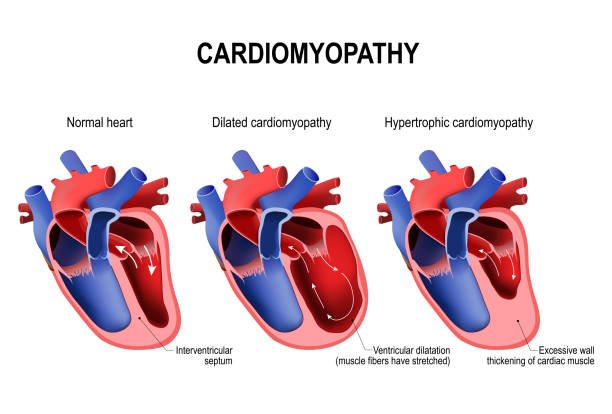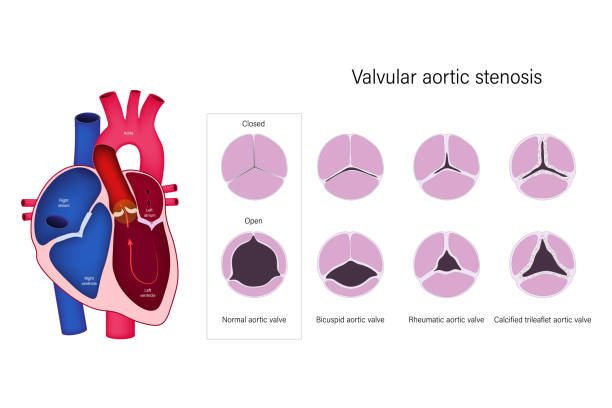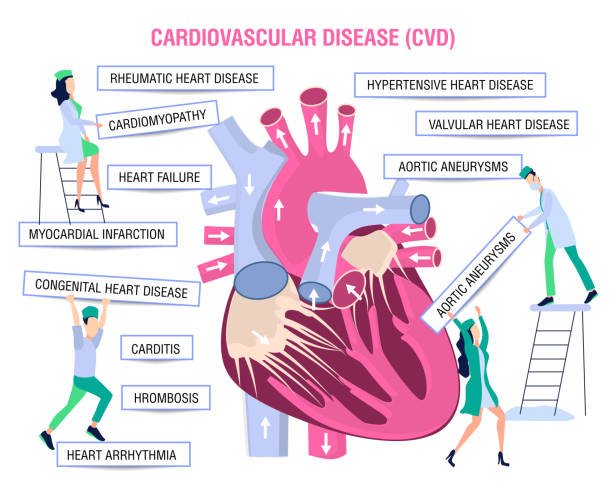
Heart Disease Has a Higher Death Rate Than Cancer! Understand Heart Disease Symptoms, Diagnosis, and Treatment
Definition and types of heart disease
Heart disease generally refers to all diseases that affect the heart, such as coronary heart disease, arrhythmia, congenital heart disease, etc. When talking about heart disease, we may often include cardiovascular disease in the discussion, but cardiovascular disease mainly refers to angina pectoris, stroke or myocardial infarction caused by blood vessel stenosis or blockage. In addition, Some diseases that may affect the heart muscles, valves, and heart rhythm can also be classified as a type of heart disease.
Causes and symptoms of heart disease
Different types of heart disease have different symptoms and causes. The following article will introduce them to you one by one.
Cardiovascular diseases
Atherosclerosis is often closely related to cardiovascular disease. When fatty plaque accumulates in arteries, it thickens and hardens the arterial walls, making it more difficult for blood to pass through arteries and reach various organs and tissues.
Symptoms of cardiovascular disease
For example, coronary heart disease is a very common cardiovascular disease. In addition, the common symptoms of men and women are also different. For example, men are more likely to have angina, while women are more likely to have symptoms such as shortness of breath, nausea, or extreme fatigue.
The following are other symptoms of cardiovascular disease:
- Angina pectoris (sense of pressure from heavy objects)
- Chest tightness
- Difficulty breathing, rapid breathing
- nausea
- Neck, throat, jaw, abdominal, and back pain
- Extremities feel numb, cold, and particularly weak
- arrhythmia
In fact, the heartbeat is not controlled by the muscles independently, but the current signal sent through the sinoatrial node (SA node, also known as the rhythm point) stimulates the heart muscles to contract to produce the heartbeat. If this current signal is blocked or delayed, it may cause abnormal heartbeat frequency and lead to arrhythmia.
Symptoms of irregular heartbeat
Arrhythmias may occur if the heart beats too fast, too slowly, or irregularly, but generally speaking, arrhythmias occur in people with congenital heart disease or injuries to myocardial tissue. The following are symptoms related to arrhythmia:
- Angina pectoris
- Chest discomfort
- Difficulty breathing, rapid breathing
- Dizziness
- Feeling light-headed and about to faint
- syncope
- Atrial flutter

Congenital heart disease
Most congenital heart defects may appear with the development of the heart after the fetus is one month old in the mother’s belly. The defects may be caused by drugs and genes. As for heart defects in adults, they go undetected because symptoms are not obvious when they are young, and are not discovered until adulthood when symptoms gradually become apparent.
Symptoms of congenital heart disease
Patients with congenital heart defects are more likely to suffer from other complications. More serious congenital heart disease will show the following symptoms soon after birth or in early childhood:
- The skin is light gray or blue.
- Swelling in the legs, abdomen, and around the eyes.
- Babies may experience shortness of breath when drinking milk, which may affect their growth and development.
- Some milder forms of congenital heart disease may not be diagnosed until teenagers or adults. Symptoms include:
Particularly prone to shortness of breath or fatigue during exercise
swelling of hands, feet, or ankles
Cardiomyopathy
Cardiomyopathy refers to the hypertrophy or enlargement of the patient’s heart muscle. Cardiomyopathy can be subdivided into dilated cardiomyopathy, hypertrophic cardiomyopathy (Hypertrophic cardiomyopathy), and restrictive cardiomyopathy (Restrictive cardiomyopathy), as follows List possible symptoms:
- Dizziness in breathing at rest or when tired.
- Swelling of feet, legs, and ankles.
- Tired.
- Abnormal heart rhythm, such as a particularly fast or violent heart rhythm.
- Dizziness, light-headedness.
- syncope.

Heart infection
Bacteria, viruses, fungi, and parasites may invade the human body and cause heart infection symptoms such as myocarditis and endocarditis. Common infections include Coxsackievirus, influenza virus, and grapevine aureus. Staphylococcus aureus, Trypanosoma cruzi, etc. (Trypanosoma cruzi may cause Chagas disease)
Symptoms of heart infection
People infected with myocarditis and endocarditis may experience the following symptoms:
- Angina pectoris
- fever
- Chills
- skin rash
- swelling of lower limbs
- arrhythmia
- Keep coughing
Valvular heart disease
The opening and closing of the heart valves can control blood flow; however, congenital valve defects, rheumatic fever, connective tissue diseases, or heart infections may cause damage to the heart valve function, causing blood reflux, valve stenosis, prolapse, sclerosis, and even rupture. And other issues. People with valvular heart disease may have the following symptoms:
- tired
- Shortness of breath
- arrhythmia
- Swelling of legs and ankles
- Angina pectoris
- Heart murmur (the sound of blood passing through the heart valves)
- syncope

Rheumatic heart disease
Rheumatic heart disease is caused by rheumatic fever caused by bacterial infection, which becomes rheumatic heart disease after injury to the heart; rheumatic fever is caused by infection with Group A β-hemolytic streptococcus ) caused by strep throat (Laryngopharyngitis) or scarlet fever (Scarlet fever).
Rheumatic heart disease symptoms
Rheumatic heart disease causes damage to the heart valves, and people with rheumatic heart disease may experience irregular heartbeats, difficulty breathing, and swelling in the abdomen or lower limbs. The following are symptoms of rheumatic fever:
- Red, swollen and painful joints.
- fever.
- A small, painless lump under the skin.
- Angina pectoris.
- Erythema marginatum.
- Uncontrollable body movements, such as Sydenham chorea.
Hypertensive heart disease
Hypertensive heart disease in English generally refers to various types of heart disease caused by high blood pressure, such as coronary heart disease and heart valve disease. The causes of high blood pressure may come from high-cholesterol diet, obesity, smoking or alcohol abuse, etc.
Hypertensive heart disease symptoms
Long-term chronic hypertension is the main cause of hypertensive heart disease. The following are related symptoms:
- Angina pectoris
- Difficulty breathing, rapid breathing
- Back, neck, arm, shoulder pain
- swelling of ankles and legs
- Chronic cough
- Loss of appetite
- fatigue
- Chest tightness

When should you seek medical help?
If you find yourself experiencing symptoms of angina, shortness of breath, or even fainting, seek medical attention as soon as possible. Early detection of heart disease can help with treatment, so if you are worried that you have heart disease, talk to your doctor about ways to prevent it or reduce your risk. This is especially important for people with a family history of heart disease.
Risk factors for heart disease
If you have the following risk factors, you will have a higher chance of suffering from heart disease. To prevent heart disease, you should try to avoid the following risk factors for heart disease:
- congenital genetic factors
- old age
- male
- family history
- acquired environmental factors
- smokes
- drug
- high cholesterol diet
- hypertension
- diabetes
- obesity
- pressure
- Poor hygiene habits
Diagnostic methods for heart disease
The diagnosis you make depends on what kind of heart disease your doctor thinks you may have. In addition to the common blood draws and chest X-rays, your doctor may also use the following methods to diagnose the type of heart disease.
- Electrocardiography (ECG or EKG for short)
- Holter monitoring
- Echocardiography
- Coronary angiography
- Cardiac Computed Tomography (CT)
- Cardiac MRI
Complications of heart disease
- heart failure
- Myocardial infarction (also known as heart attack)
- Stroke
- Aneurysm
- Peripheral artery disease
- Sudden cardiac arrest
Treatment and improvement methods for heart disease
Treatment for heart disease varies not only from person to person, but also from type to type. For example, if a patient has heart disease caused by a heart infection, antibiotics will be used to destroy the disease-causing bacteria, but if the heart disease is not caused by infection, other methods may be used. Simply put, the treatment of heart disease may be divided into three levels:
- change living habits
- medical treatement
- Surgical treatment
Heart disease care and prevention methods
While receiving treatment, building a healthy lifestyle and getting rid of harmful habits will help improve the treatment effect and prevent the worsening of heart disease. Ordinary people can also reduce the risk of heart disease through the following methods.
- Keep checking
- Measurement of blood pressure
- Check cholesterol
- quit smoking
- sports
h - ealthy diet
- Weight control
- relieve stress
- Maintain a healthy and positive mental state
- good hygiene habits












